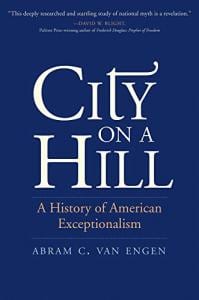Today we welcome Abram Van Engen to the Anxious Bench. Abram is Associate Professor of English and holds a courtesy appointment in the John C. Danforth Center on Religion and Politics at Washington University in St. Louis. He is the author of the recently published and critically acclaimed City on a Hill: A History of American Exceptionalism.
On June 1, President Trump cleared peaceful protestors with tear gas and rubber bullets in order to pose with a bible by a church. This act spoke directly to his base, which includes a large number of white evangelical Christians, and it validated false Christian histories of America that many of them accept. For too many people today, America can be great only if it is Christian, and it can be Christian only if it was founded by evangelical figures on the basis of biblical principles.
This view of a biblical nation is widespread and seems to be rising, partly in reaction to protests and undertakings like The 1619 Project. Not long before Donald Trump’s awkward pose, for example, the prominent evangelical Os Guinness gave a lecture stereotyping the American Revolution as “biblical” and the French Revolution as secular. Such an account cannot make sense of the actual actors and factors that went into each, as John Fea—a Christian historian—explains. But Os Guinness is only a part-time partaker in these mythic histories. David Barton is the most full-time falsifier of the American founding, but Eric Metaxas remains the most popular. According to Metaxas, for example, John Adams was “a committed and theologically orthodox Christian,” though in reality Adams denied the Trinity and the deity of Christ.

The histories of America posited by Metaxas and others like him contain a multitude of errors, as plenty of historians have pointed out. But where the historical problems are obvious, the theological dangers in their methods can often be harder to spot. So let me identify three.
First, these histories of America represent a failure of love. For far too long, accounts of the American founding touted by too many white evangelicals have tended to erase, ignore, or downplay slavery, injustice, and oppression. As a result, the story of racial minorities in America—including faithful non-white Christians, many of whom are keeping Christianity alive in America—get written out of our nation’s past. It is hard to love others while refusing to listen to them, and Christian nationalist histories are, in large measure, a refusal to listen—an unwillingness to reckon with the hard truths that haunt the past and present of so many in America today. When Os Guinness calls the American Constitution “biblical,” for example, he fails to acknowledge that the Constitution officially recognized the legality of slavery and ensured its survival for another seven decades.
American history is not a tale only of failure and oppression and abuse; but it is also not a tale only of freedom, achievement, and success. Only when we begin to see the multiplicity and complexity of history can we begin to understand how God moves in it and through it, and how we, in the present, can and should respond—righting wrongs and attempting to shine a light in dark places. The gospel depends not on the power of the government or our ability to claim political influence at any cost. It depends on the grace of God, which calls on the church to act as the Body of Christ. And a church divided by false histories of our country cannot be the force of healing this world needs.
Second, the histories that undergird Christian nationalism position the United States as the savior of the world. On this telling, government institutions and political parties are more significant actors than the church. Taking political power or retaining it becomes the highest priority. Politicians become the guardians of the gospel. The president violently disperses peaceful protestors to wield a bible above his head.
This replacement of the church with the nation has a long history. Its favorite expression is the idea of America as a “city on a hill,” a biblical phrase (Matthew 5:14) that referred almost exclusively to the church throughout most of American history—until, during the Cold War, scholars like Perry Miller and politicians like Ronald Reagan coopted it for the country.
If “city on a hill” is the latest version of this idolatry, its purest form comes in a 1909 sermon by the social gospel minister Washington Gladden. Preaching to the American Board of Commissioners for Foreign Missions, Gladden explained that God’s promises “are made to the nation and not to the church.” Identifying the United States as the New Israel, he claimed that the truest evangelists were American politicians. “There have been great preachers of the gospel, great missionaries of the cross,” he preached, “but few, I believe, who have presented the principles of our religion to the non-Christian world more convincingly than William McKinley and John Hay and John W. Foster and Theodore Roosevelt and Elihu Root and William H. Taft.” Whenever the nation becomes blended as one with the church, politicians become the priests of God’s kingdom. Those who believe in Christian nationalism seem to think that the gospel hinges on the government.
Finally, beyond a lack of love and a dangerous idolatry, Christian nationalists ultimately undercut their own faith by failing to trust in the sovereignty of God. Essentially, their histories of America tell God how he should have acted, rather than examining how he did. David Barton and Eric Metaxas seem to think that evangelicals should have founded the United States. And so, in their telling, they did, regardless of historical records. Their histories, in other words, treat God as an incapable sovereign. Since God couldn’t be trusted to get things right, Barton and Metaxas will take matters into their own hands, rewriting history to mop up God’s mistakes. Theirs is a clean version of the American founding, unblemished by all that still marks and mars society today.
There are plenty of good historians at work today, including many Christians historians, and what they have in common is a desire to know God and God’s world better by trying to understand what has actually occurred and why. The Conference on Faith and History does not have a popular following (like Metaxas), but it nonetheless gathers faithful Christians, many of whom study the nation. None of these scholars feel their faith threatened by facts. All of them feel compelled to follow historical records where they lead.
The dangers of Christian nationalism for both Christianity and the nation mount with each rewriting of the American past. If Christians are to be committed to both truth and love, then we must commit to as true and full a history of the nation as we can tell, loving our fellow citizens, refusing to worship a false image of the nation, and trusting, finally, in a sovereign God.













